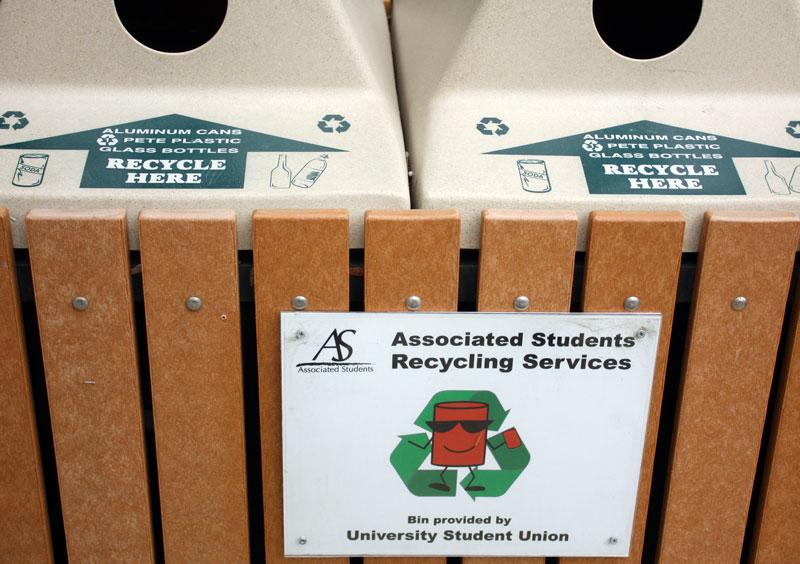
The A.S. Recycling Center is moving forward in implementing its plans of expansion starting with small additions such as more recycling bins around campus.
“There is a vigorous but limited recycling effort on campus,” said David Crandall, A.S. general manager.
The working conditions of the recycling center staff are not good, Crandall said in reference to the fact that a metal cargo container was turned into the staff’s office.
“We realized we needed a good, healthy working space,” Crandall said.
The vision for the building is to construct an environmentally advanced building with a couple of offices, a kitchenette, bathroom and a seminar room for educational and administrative purposes, Crandall said.
“The educational aspect is why the program is expanding,” said Rolando Valiente, recycling field supervisor.
Crandall said he worked with A.S. recycling coordinator Cyndi Signett to draft a program statement of their vision for the potential additions to the recycling center.
A.S. spent $7,500 to hire Terra Solutions Consulting Company to complete a feasibility report on how to improve the recycling center, Crandall said. The report included suggestions on what more could be recycled and what equipment could be added to make it more efficient, Crandall said.
“A lot is changing in practices of what we do now,” Crandall said. “For example, the recommendation of putting more recycling bins next to trash cans.”
“Teachers have been asking for more bins to put in their classrooms and people are requesting for more (bins) at their special events as well,” Valiente said. “In the past, there weren’t too many requests like this. It has to do with the awareness that already exists.”
Signett said she has been working with Crandall on starting to act on some of the recommendations already. Some of the recommendations included looking into getting bins for special events, a washing station and new equipment such as a baler, she said.
Buying a baler for cans and cardboard will make it easier and more space efficient for the hauler because they can put more on the truck, make fewer trips and save gas, Crandall said.
“Sometimes when we do things, we think how much it costs now rather than over time,” Crandall said. “We need to really think ahead of our usual practices. The echoes of some of these processes play on and on.”
Building something made out of recycled materials and making the electricity solar powered or wind powered will also cut down on costs down the road, Crandall said.
“It’s not just about recycling, it’s about other issues of sustainability as well,” Crandall said. “Reducing, reusing and recycling, that’s what we’re all about.”
Before moving on with construction, the plan needs to be approved by the campus planning board and the chancellor’s office, Crandall said. The funds for the project will also need to be raised over time. The overall costs will probably be about $1 million, Crandall said.
“We are fortunate to have the campus quality fee to bring in some of the money,” Crandall said.
The campus quality fee allowed A.S. to direct about $120,000 per year to start collecting money to make the vision a reality, Crandall said.
“We will need to go to companies and government corporations for support,” Crandall said. “We’ll be able to ask them ‘Will you do this with us?’ not ‘Will you do this for us?’ because it’s not just their money going into it, it’s ours too.”
Students started the original recycling center on campus in 1990, Crandall said. It was shut down because they didn’t have the right resources to make it efficient. A.S. got involved in 1991, which helped organize and make the center what it is today, Crandall said.





